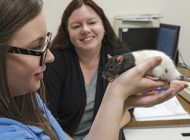 Thanks to life in the digital age, when information is as close as a swipe and a tap away, old-school philanthropy has been turned on its head.
Thanks to life in the digital age, when information is as close as a swipe and a tap away, old-school philanthropy has been turned on its head.
Donors want—and can find—more information about the causes and organizations they support. They want to feel confident that their gift is going to make a difference; and with the help of online reviews, neutral information services like GuideStar and Charity Navigator, and watchdog reporters like CharityWatch, useful information is more readily available than ever before. If a nonprofit is not stewarding the gifts it receives in the most effective and responsible way possible, donors will know—and they might not be willing to commit their energy and resources to that organization.
Influenced in part by the Millennial generation, donors of all ages and stages have begun to think of philanthropy as more of an investment than simply a gift. And they seek a social return on this investment. They want, as part of a philanthropic package deal, tools to measure the environmental, social, and financial impact of giving. As the younger generation brings its zeal for metrics to giving, measuring social and fiscal impact is becoming ever more important to all donors.
Once today’s philanthropists have done their research and are fully committed to a cause, they often want to roll up their sleeves and work side by side with the members of their chosen organization. For many donors now, it’s not enough to simply write a check. Philanthropists like John D. ’85 and Carrie Morgridge believe that solutions to social problems come from active engagement with people on the frontlines. They’re seeing the value of contributing their own knowledge, expertise, and relationships to the organizations they support.

John D. ’85 and Carrie Morgridge believe that solutions to social problems come from active engagement with people on the front lines. Last fall, they met with members of PSU’s Student Support Foundation. Kaleb Hart ’11 photo.
For the Morgridges, supporting education—in particular, innovative advances in education—has always been a top priority. Virtually everything they do as philanthropists is influenced by their desire to help students of all ages be prepared to meet the demands of a twenty-first century workforce. Whether they’re investing in teacher training and interactive whiteboards for public school districts or backing STEM programs that teach elementary schoolchildren problem-solving skills and entrepreneurship in addition to science, technology, engineering, and math, the Morgridge Family Foundation makes accessible learning its focus.
As Plymouth State has worked to change the landscape of higher education through the development of interdisciplinary initiatives, learning laboratories, and partnerships with the community, the Morgridges have been paying attention. And, true to nature, they have gotten involved. Their commitment to supporting John’s alma mater as it pioneers changes in education has resulted in a partnership that is allowing students to emerge from PSU not as strangers to the real world, but as welcome, familiar friends.
The Circle of Philanthropy
They should know. In addition to establishing the Morgridge Family Opportunity Scholarship at Plymouth State in 2004, which has provided scholarships for 40 students thus far, in 2005 the Morgridges formed a PSU chapter of their youth philanthropy club, the Student Support Foundation (SSF). The SSF’s mission is to keep students in school through short-term emergency assistance (such as clothing for internships or funds for textbooks) and long-term student support (such as funding to start a program that is not part of the normal operating budget), and to create a culture of philanthropy in the campus community.

Back Row: John Farnam (Community Investment Liaison, Morgridge Family Foundation), John Morgridge ’85, Carrie Morgridge, Sam Wisel ’12, ’16G, Matt LeBlanc ’16. Front Row: Sophia Paglierani ’17, Anna Brown ’16, Courtney Bracken ’16, Savannah Fitzpatrick ’12, Elizabeth Thagouras ’17. Kaleb Hart ’11 photo.
What makes the SSF special as a granting body is that the grantors are all students. Each year, the Morgridge Family Foundation gives the SSF $4,000 to make grants in the club’s established funding priorities. Student members determine how the money will be allocated, raise additional funds, and oversee the operation of an on-campus food pantry. At the end of each school year, members submit an annual report, detailing grants, budgets, and success stories. By reviewing applications and awarding grants to students in need, members of the SSF learn about poverty and the life skills of service and philanthropy.
“They come to realize that a very small donation to a fellow student for reading glasses, or a few dollars for gas to take advantage of an internship, can make a real impact,” John says. It’s not uncommon for members of the SSF board of directors to be former recipients of SSF grants themselves, motivated to give back after experiencing the impact of a small gift at the right moment. Others join with noble but fuzzy ideas of contributing to the betterment of the world, but end up receiving something more valuable than they ever imagined, which is just what the Morgridges hoped for when they introduced the Student Support Foundation to Plymouth State. Experiential clubs like the SSF encourage students to develop, express, and sustain positive social identities as helpful and compassionate members of the community.
For Adam Murata ’16, joining the SSF had personal significance. “I know there’s a lot of need out there. In fact, there have been several times in my life when I could have used something like the food pantry,” he says. “Having been in that situation myself, I felt like this was a good opportunity to try and help people out, as well as meet good people that want to do like work.”

Adam Murata ‘16 volunteers at the Student Support Foundation food pantry, where 66 students in need were served last year. The food pantry also delivered eight large crates of food to the financial aid office to be distributed to still more students. Kaleb Hart ’11 photo.
When Courtney Bracken ’16 began volunteering at the SSF food pantry she was not aware of the extent of student need on campus. “I assumed everyone had meal plans so everyone should be fine, but that’s not the case,” she says. “People started coming for food during my volunteer hours and it really opened my eyes.” Since then, Bracken, who now serves as Student Support Foundation secretary and food pantry manager, has been involved in the Morgridge Family Foundation’s Dream Big project celebrating the SSF’s 10th anniversary on the PSU campus: moving the pantry to a bigger, more welcoming location. After almost a year of hard work by SSF members—writing grants, spiffing up the space, and finally moving this past fall—the new food pantry is up and running with more visitors than ever, Bracken says.
Fueling the Passion
Plymouth State is not alone among state universities witnessing—and adapting to—the multifaceted paradigm shift in recent decades. Friends and benefactors like John and Carrie Morgridge are now inspiring donors to emerge from the background and get into the clubs and classrooms of causes they support. As John says, “We encourage people to find their passion because fulfillment is what motivates you to give more. We need that reinforcement for our heart and our soul.”
As for John and Carrie, nothing makes them happier than to be part of this circle of giving. “We feel very fortunate to give students an opportunity to support their community, an opportunity they might not have known they had,” John says. “Students feel the same way we do when we’re philanthropic: It feels like you’re making a difference as a human in this world.” ■ Emilie Coulter
Tags: education food pantry millennials Morgridge Family Foundation new philanthropy philanthropy scholarship social impact social return on investment Student Support Foundation

















